What is the BEC CPA Exam Section?
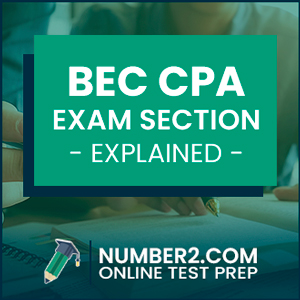 The Business Environment and Concepts (BEC) CPA exam section tests CPA candidates’ overall understanding of a business concepts, cost accounting topics, and management accountant operations. Unlike other CPA sections with only multiple-choice questions (MCQs) and task-based simulations (TBSs) testlets, BEC has an additional set of questions on written communication.
The Business Environment and Concepts (BEC) CPA exam section tests CPA candidates’ overall understanding of a business concepts, cost accounting topics, and management accountant operations. Unlike other CPA sections with only multiple-choice questions (MCQs) and task-based simulations (TBSs) testlets, BEC has an additional set of questions on written communication.
Most CPA candidates find this to be the easiest of the four CPA exam sections. According to the AICPA, BEC has the highest average pass rate of 62%, higher than the overall average of 45-55%. It, however, takes proper planning and preparation to attain the pass scores.
Let’s dive into the BEC exam section and examine the topics, grading scale, as well as some tips to how to pass the BEC exam.
How Long is the BEC Exam Duration?
The BEC CPA section is a 4 hour long exam. Candidates are allowed 10 minutes to go through the pre-test questions and a 15-minute break after the first TBSs plus two non-compulsory breaks after the first and second MCQ testlets only that the time does not stop. To complete the entire exam in time, you must plan and allocate sufficient time for each testlet.
In case a section or question is taking more time than necessary, feel free to flag it and proceed to the next but do not forget. Ensure that all questions are answered, even if you are not 100% sure of the answers, to increase your chances of passing.
BEC Section Exam Topics & Materials Tested
The BEC exam covers five key areas: corporate governance, economic concepts and analysis, fiscal management, information technology, and operations management.
Each topic accounts for a specific percentage of questions on the BEC exam as follows:
Corporate Governance: Questions around this topic range between 17% and 27% of the overall examination. The areas may vary from internal control, enterprise risk management, and regulatory frameworks.
Financial Management: Proper knowledge of fiscal management is important, and the exam will cover areas such as capital structure, working capital management, associated fundamentals, methods of financial valuation, and decision models. There should be about 11-21% of the questions from this area.
Information Technologies: Here, the exam looks at different governance issues surrounding information technology, how it affects businesses, information availability and security mechanisms, the integrity of information technology processes, and the design and maintenance of information systems. Expect between 15% and 25% of questions from these and related topics.
Economic Concepts And Analysis: The questions here will assess the understanding of the candidates about different economic concepts and their ability to analyze and draw conclusions. They cover about 17-27% of the total exam on areas such as economic business cycles, financial risk management, and how markets influence business.
Operations Management: The exam should have about 15-25% of questions drawn from operations and management accounting. The areas may include how to measure performance using financial and non-fiscal metrics, cost accounting, process management, and improvements, among others.
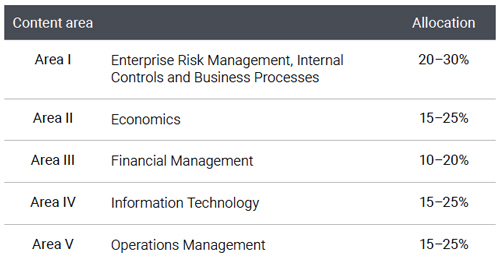
The BEC exam is designed to test your higher level skills as they relate to accounting and business. In most cases, 50-60% of these questions will seek to evaluate your ability to apply learned concepts in a real-life work situation.
Your memory and understanding will also be tested with about 15-25% of the questions, while your analytical skills will be put to the test with about 20-30% of the questions.
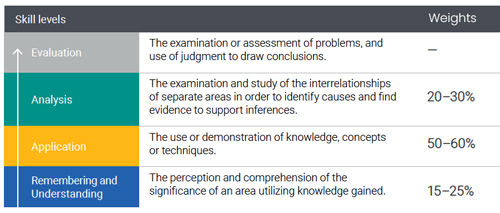
BEC CPA Exam Structure & Format
The BEC exam section consists of two multiple choice testlets, two sets of task-based simulations, and three written communication exercises. The MCQ testlets are designed to gauge your understanding of business operational and management concepts. The first set of multiple-choice questions will be moderately difficult. If you do well on this set, your second set will be more difficult.
This is a good thing because the more difficult questions are weighted more giving you better odds of getting more points. If you don’t do well on your first set of MCQs, you will be given an easier set for the second set.
After you finish the two MCQ testlets, you will move on to the simulations. Since BEC has the written section, you only have four simulations instead of the typical eight on other CPA exam sections.
Finally, you will have 3 written communication exercises to finish the exam.
Here’s a rundown of the full BEC exam question structure and format of MCQs, simulations, and written communications.
BEC Section Exam Structure
| BEC CPA Exam Section | 2022 CPA Exam | 2021 CPA Exam |
|---|---|---|
| Multiple-choice Questions | 62 | 62 |
| Task-based Simulations | 4 | 4 |
| Written Communications | 3 | 3 |
BEC Section Exam Format
| BEC Exam Testlets | Question Types | Time / Duration |
|---|---|---|
| Testlet #1 | 31 Multiple-choice Questions | 60 minutes |
| Testlet #2 | 31 Multiple-choice Questions | 60 minutes |
| Testlet #3 | 2 Task-based Simulations | 30 minutes |
| Testlet #4 | 2 Task-based Simulations | 30 minutes |
| Testlet #5 | 3 Written Communications | 60 minutes |
BEC CPA exam Study Tip: Don’t get stuck on any one question too long. If you can’t figure out the answer, mark the question and come back to review it before you submit the testlet. Wasting too much time on a single question might not leave you with enough time to finish the test.
Multiple Choice Questions
There are 62 MCQs in the exam, 12 being pre-test questions and therefore not scored, and 50 actual questions that you should answer as accurately as possible. There are two testlets here, each with 31 questions.
Note that the complexity of the second testlet will depend on how you perform in the first testlet. The first testlet of MCQs contains questions of medium complexity. If you answer most of them correctly, then expect a more complex second testlet and vice versa.
BEC CPA exam Study Tip: Some multiple-choice questions are designed to be tricky. Don’t try to skim the question and move on to the answers. You might miss an important key phrase in the question. Always read for full question.
Task-Based Simulations
Unlike MCQs where you simply select any one of the four provided answers, you must type in the answers for the TBSs. That makes simulations more challenging because there aren’t any answers to choose from. You will have to do the research or calculations and simply type in an answer.
There are four questions, one being a pre-test question that is not scored. The section has two testlets, each with two questions.
Written Communication Tasks
BEC is the only CPA exam section with a written communications component. These questions evaluate your written communication skills. The ability to communicate effectively in an organization is important as it will play a huge role in how you engage clients and even colleagues.
There are normally three questions, one being a pre-test question that is not scored. You may be asked to write a specific response to a question, such as a memo or a report targeted at a specific audience within the allocated time.
BEC Exam Testlet & Simulation Time Length/Duration
The entire BEC exam is only four hours in length with no time limits on each testlet. It’s up to you to pace yourself and not spend too much time on a single section, so you can complete the entire test.
To ensure that you complete the examination at a suitable time and answer all the questions accurately, you must plan your time accurately.
How to manage your BEC test time
For multiple-choice questions, you should allocate about 1 hour for each testlet. That equates to approximately 1 minute per MCQ question.
Task-based simulations are more difficult than MCQs and require more time. You should allocate about 1 hour to finishing the simulations. That equates to about 20 minutes per simulation.
The written communication question time will vary for all candidates. It depends how good you are at writing and how quickly you can type. A good rule of thumb is to leave yourself at least 1 hour to finish the three written questions. That will give you about 20 minutes per exercise.
Note that the less time you take on a question, the better for you because you will have sufficient time to review and revise your answers before time runs out.
How Is BEC Graded & Weighted?
Unlike the other CPA exam sections, BEC does not weight the MCQs and simulations equally. The multiple-choice questions account for 50% of the score, while the task-based simulations and written communication questions make up 35% and 15% of the score, respectively.
This means that the AICPA has decreases the emphasis on MCQs to test your written communication skills. It also means that the written portion is not worth as much as it could be. In prior years, the BEC weighted MCQs as 85% of your score. With the addition of the simulations, BEC has gotten slightly easier for many candidates as seen in the pass rates year over year.
Below is the AICPA content area and skill allocation graded weights for the BEC exam section. This AICPA chart displays what CPA candidates’ skills and knowledge are tested on BEC and what candidates should study to get a higher score on the BEC exam.
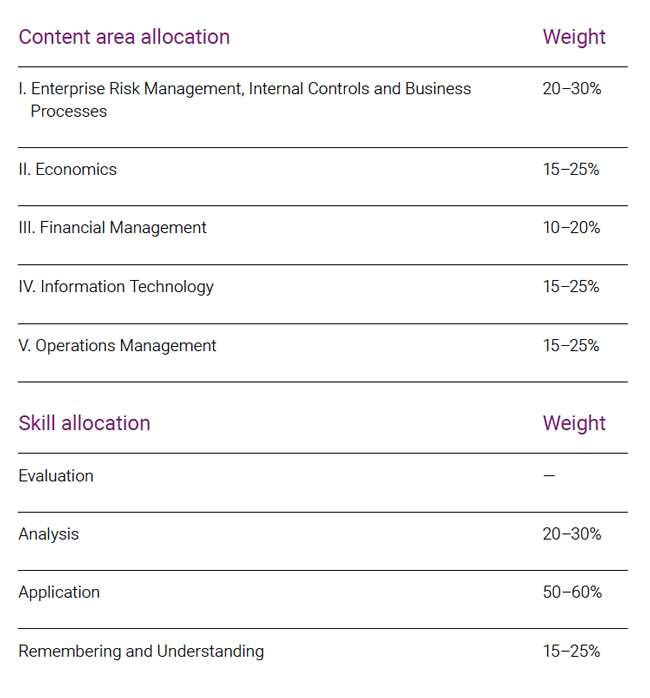
MCQ & Simulation Grading Percentage Distributions
What percentage of your BEC score is made up of multiple-choice and simulation answers? The BEC CPA exam departs from the other exam sections that score and weight MCQs and simulations equally. The BEC section weights your score in the following: MCQs 50%, simulations 35%, and written communications 15%.
This means that MCQs are still the most important part of the BEC section with half of your score is based on MCQs. It also means that the written portion is not that important. It is possible to pass BEC without even completing the written portion.
| CPA Exam Section | Grading Score Distribution |
|---|---|
| AUD | MCQs: 50% TBSs: 50% |
| BEC | MCQs: 50% TBSs: 35% WC: 15% |
| FAR | MCQs: 50% TBSs: 50% |
| REG | MCQs: 50% TBSs: 50% |
BEC Exam Pass Rates
Below is a graph of the BEC CPA exam pass rates from 2010 to the present:
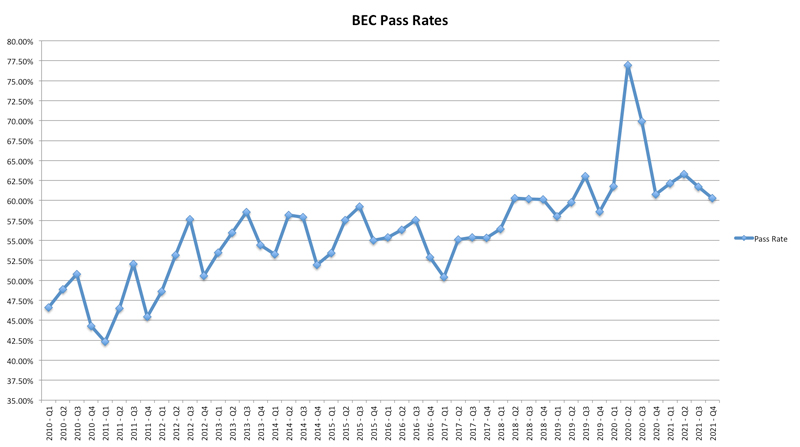
In the past few years the Business Environment & Concepts exam section has had the highest CPA pass rate out of any exam section. On average CPA candidates have performed the best on BEC almost every quarter since 2011.
This overwhelming pass rate for BEC is typically used as evidence to show that BEC is the easiest CPA exam section. Since more candidates pass this section on average than other sections, this might be a fair statement. It might also be that CPA candidates have adapted to the written exercises and are better prepared for them than other simulations.
The AICPA has more information about the pass rates here.
BEC CPA Exam Study Tips
BEC is a diverse section, requiring the candidates to master several topics and be able to answer them appropriately in an exam. Here are some important tips to help boost your chances of passing.
Memorize But Understand: Even though it is good to memorize what you study, understanding the concepts and how to apply them is particularly important. Therefore, study widely, memorize and understand.
Improve Your Writing: Your writing skills will be evaluated in this examination. Even though written communication may account for only 15% of the whole exam, your ability to write effectively as per provided guidelines will help you secure these important scores.
Manage Time Well: Do not waste too much time on one question. Instead, plan well and attend to all the questions within the allocated time. Do not leave any blank spaces.
Review Writing Answer Explanations: Use your review course the BEC written communication question explanations. Go through each CPA exam simulation in your ultimate CPA exam guide to see what the AICPA questions are looking for and how to improve your writing skills to ace the written section.
Should I take the BEC exam first?
BEC is typically not a great first CPA exam section for a few different reasons. BEC is a better middle exam, as it typically takes less time to study for. That way you can get a slight break from the more intense sections.
Generally speaking, you should take the section you are most familiar with first. Here’s a full guide on your first CPA exam section.
Should I take the BEC exam last?
The BEC section is a great exam to take last simply because it’s not really connected to the other exam sections. The topics don’t overlap that much, so it’s kind of it’s own unit.
Plus, BEC tends to be the easiest CPA exam for most candidates. I’m not saying that you should underestimate it because it’s still a tough test, but it does have the highest pass rates out of any section. Taking BEC last would be a great way to finish the CPA exam.
Who is the BEC exam easiest for?
BEC might be considered a less complex section of CPA due to its above-average pass rate. Even though any CPA student can easily pass this section, the following candidates have exhibited a higher pass rate than the rest.
Recent Business Students: Candidates who recently took business, finance, or economics classes tend to do well on BEC because this section focuses on financial ratios and business management concepts. There are many cross-cutting concepts that can come in handy during the exam.
Candidates With Experience: Candidates who have come management accountant experience working with budgets and cost accounting concepts also tend to do well on BEC. The ability to apply workplace experience in an exam sets the candidates above the rest. Some knowledge of technology is also important for this role.
Wide Readers: The only way to pass an exam is to read extensively. Studying extensively broadens the mind, enabling one to accurately answer exam questions and increase their score.
Effective Communication Skills: How effectively can you communicate? Do you have a way with words? Candidates with proven written communication skills will enjoy the exam, especially the written communication section.
Who is the BEC exam hardest for?
It might be every CPA candidate’s favorite because of the higher pass rate, but do not be deceived. There is a group of about 40% of candidates who fail this exam. The following are likely to face challenges.
Non-studiers: Just because BEC has the highest pass rates doesn’t mean it’s an easy exam. You still HAVE to study in order to pass it. Candidates who don’t stuff and just try to take the test inevitably become part of the 40% who fail.
Poor Writers: About 15% of your BEC score is based on your ability to write clearly and communicate a concise message. People who are bad writers, have poor grammar, and don’t practice will have a difficult time with the written communication section.
Poor Time Management: The exam questions might appear easy, but if you do not plan your time accordingly to effectively respond to each question, then there is a higher risk of failing the exam.
Other CPA Exam Sections
- AUD CPA exam section
- BEC CPA exam section
- FAR CPA exam section
- REG CPA exam section
- Breakdown of all 4 CPA exam parts
What’s the best CPA study course for BEC?
The only real way to pass BEC is to use a CPA review course that works with your learning style. Let’s face it. There’s way too much to cover on this exam to try to study on your own. You need the help of a review guide. I know I did!
A study guide will help you practice answering questions and drill the concepts into your memory. You will understand how the questions are structured and gain an overall understanding of what’s expected on the exam.
The best BEC course is the one that works for you and matches how you learn. Think about how you learn. It could be with videos, practice questions, textbooks, etc. Not get the course that has those features. We’ve reviewed all the top courses, so you can decide which is right for you and will help you ace the BEC exam.

